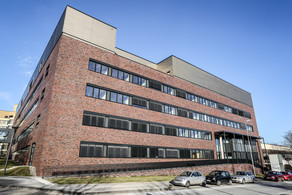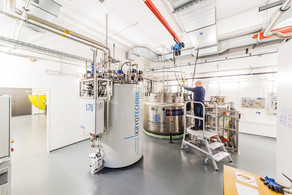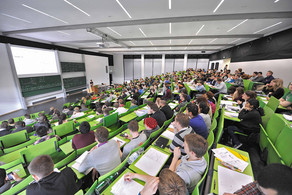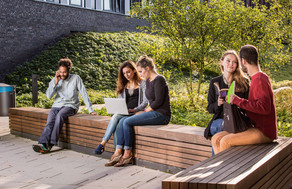State promotes further digital teaching concepts at TU Dortmund University
- News

OER stands for Open Education Resources, i.e. freely accessible educational offerings. After completion of the respective projects, the e-learning offerings will be made available to all teachers and students at NRW universities on the state portal for studies and teaching ORCA.nrw (Open Resources Campus NRW). Dr. Dirk Günnewig, State Secretary in the Ministry of Culture and Science, said at the handing over of the awards amounting to around 900,000 euros: "With adaptive learning environments as well as virtual and augmented reality approaches, the TU Dortmund University relies on innovative solutions in its projects that already point to the future of digital teaching. Therefore, I am particularly pleased that we as a state can support these innovative projects." In the second round of calls for proposals, four project applications involving TU Dortmund University were successful. They deal with topics such as good scientific practice, adaptive learning in the subject of dynamics, basic knowledge in statistics or geological field work in virtual space.
Consortium leadership: Digital GWP-Curriculum.nrw
The Digital GWP-Curriculum.nrw, led by TU Dortmund University and with the participation of Heinrich Heine University Düsseldorf and the University of Duisburg-Essen, embeds STEM-focused good scientific practice in study and teaching. At TU Dortmund University, Prof. Kevin Kröninger (Department of Physics) and Dr. Olaf Kletke (Department of Research Data Management) form the project team. The aim is to create a sustainable awareness of good scientific practice (GWP). To this end, appropriate standards are taught and linked to questions of scientific ethics, quality assurance, science communication and research data management. The programme addresses students in Bachelor's and Master's programmes as well as doctoral students. Modularised, individual contents can be worked on, combined into e-learning courses and concluded with an examination. Slide sets and manuals are developed for lecturers.
Consortium management: ALFDYN - Adaptive Learning Environment in Dynamics as OER
The TU Dortmund, TH Cologne, University of Duisburg-Essen, RWTH Aachen and the Ruhr West University of Applied Sciences have joined forces for the ALFDYN project in order to provide students with more targeted support in their learning process in the subject of dynamics. The students use the adaptive learning environment (AL) individually, which enables continuous recording of performance levels and learning barriers. The AL sensibly combines classroom teaching and a wide range of digital teaching formats. Project leader Prof. Ingo Münch (Faculty of Architecture and Civil Engineering) and his team have been focusing on integrated learning (blended learning) since 2019 in order to combine the networking options available today with "classic" learning methods.
Project partner: DigStat - Digital learning units in statistics
In the project "DigStat - Digital Learning Units in Statistics", learning videos and interactive content, among other things, are to be used to make basic training in statistics more appealing for various courses of study. The new content is to supplement existing offerings and be made available in a modular form. Teachers can use it individually for their courses. In addition, students should be able to access the content as needed and use it to supplement their learning materials. Prof. Roland Fried and his team from the Faculty of Statistics at TU Dortmund University are involved. The Ruhr University Bochum is the consortium leader. The Heinrich Heine University Düsseldorf and the University of Siegen are also involved as project partners.
Project partner: DRAGON Ruhr (Diversity open digital terrain work in geoengineering of the Ruhr University Alliance)
In geoengineering studies, field work and site visitation have so far only been offered physically. The DRAGON Ruhr project of the Universitätsallianz Ruhr (UA Ruhr) starts here and wants to use virtual reality and augmented reality to make field work tangible for all students and thus offer diverse and barrier-free access to this study content. This should also attract new groups of prospective students. The project will also produce high-quality supplementary teaching materials. The TU Dortmund University is a partner here of the Ruhr University Bochum and the University of Duisburg-Essen. From Dortmund, Dr. Frank Könemann from the Geotechnical Engineering Department of the Faculty of Architecture and Civil Engineering is involved.
To the overview of all funded projects
Contact for queries:








